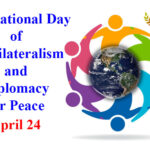BEIJING, Aug 11 (APP): It is an inevitable trend for China to export complete sets of equipment and transfer production capacity while Pakistan is the best destination to reach.
Based on Pakistan’s large population, the construction industry will grow rapidly in the next few years. As the demand for core material of the construction industry, steel, cement, glass and other industries will usher in excellent opportunities for development.
After the transfer of above industries, Pakistan’s industrial base can be enhanced and conditions for the establishment of a modern industrial system can be created.
On the other hand, the employment pressure of the population can be solved and professional industrial workers can be trained. Meanwhile, products can also be sold to neighboring countries and regions to increase exports.
These views were expressed by Jian Peng (Philip), Chief Represent of Pakistan Shenglin Consulting Co., Ltd. (PSC), who was appointed as Honorable Investment Counsellor by BOI in an interview.
The iron and steel industry is an important embodiment of the degree of industrialization of a country. At present, China is facing the pressure of energy consumption and environmental protection, represented by the iron and steel industry, and all parts of the country have to reduce the iron and steel production capacity.
A large number of equipment is facing idle or dismantling, and many of them have a short service life and are in good condition of maintenance which can continue to be used. While Pakistan lacks relevant equipment and technology,
and the cost of purchasing new complete sets of equipment is too high, which is not in line with Pakistan’s national conditions at this stage, CEN reprted.
Combined with the current preferential policies of Pakistan’s Special Economic Zones (SEZs), he recommended suitable plans to Chinese automobile enterprises and spare parts suppliers, and provided consulting services.
In order to facilitate the trade between enterprises of the two countries, Jian Peng stated that it’s necessary to standardize the product standards, operation procedures, settlement procedures and contract texts as far as possible, so as to avoid misunderstandings caused by the disunity of language, law, inspection and quarantine standards.
“Pakistan’s enterprises are generally small in scale and low in concentration, so large-scale and standardized supply chain system is needed to carry out bulk trade, which requires the strength of industry organizations such as chambers of commerce and associations to integrate enterprise resources.
In addition, the supply and demand information between the two countries is asymmetric. There is a lack of authoritative and professional information release platform, and imports and exports are mainly in a small-scale and peer-to-peer way.”
For promoting commodity trade between the two countries, especially Pakistan’s export trade to China, PSC is planning to set up a “China-Pakistan Commodity Trading Center” in Hainan to make full use of the advantages of Hainan’s free trade port to provide services to enterprises of the two countries.
It is expected that the project will be landed by the end of this year. In addition, it also considers taking advantage of Xinjiang as the bridgehead of CPEC to set up a “China-Pakistan bonded processing Park” in Urumqi Free Trade Zone to import Pakistani raw materials for further processing.
The investment environment in Pakistan has been improved considerably, especially the establishment of SEZs has played a positive role in attracting investment. “For better attracting Chinese investment,
Pakistan SEZs are suggested to directly contact Chinese local governments. China’s park management system can be introduced into Pakistan’s SEZs and Chinese enterprises engaged in the operation of industrial parks.”
Jian Peng highlighted that clean energy is a common topic all over the world, and it can be combined with the natural conditions of Pakistan to develop and build distributed energy to form an energy supply mode with the combination of backbone network and microgrid to solve the problem of uneven energy supply in key areas and remote areas.
It is learned that PSC is working with China Customs to push the official import of beef and mutton, and selecting professional investors to set up FMD free zone in Pakistan.
Considering the current situation of anti-terrorism, PSC is communicating with related departments and institutions to found commercial security protection companies in Pakistan, to provide training, protection and technical support to CPEC.






